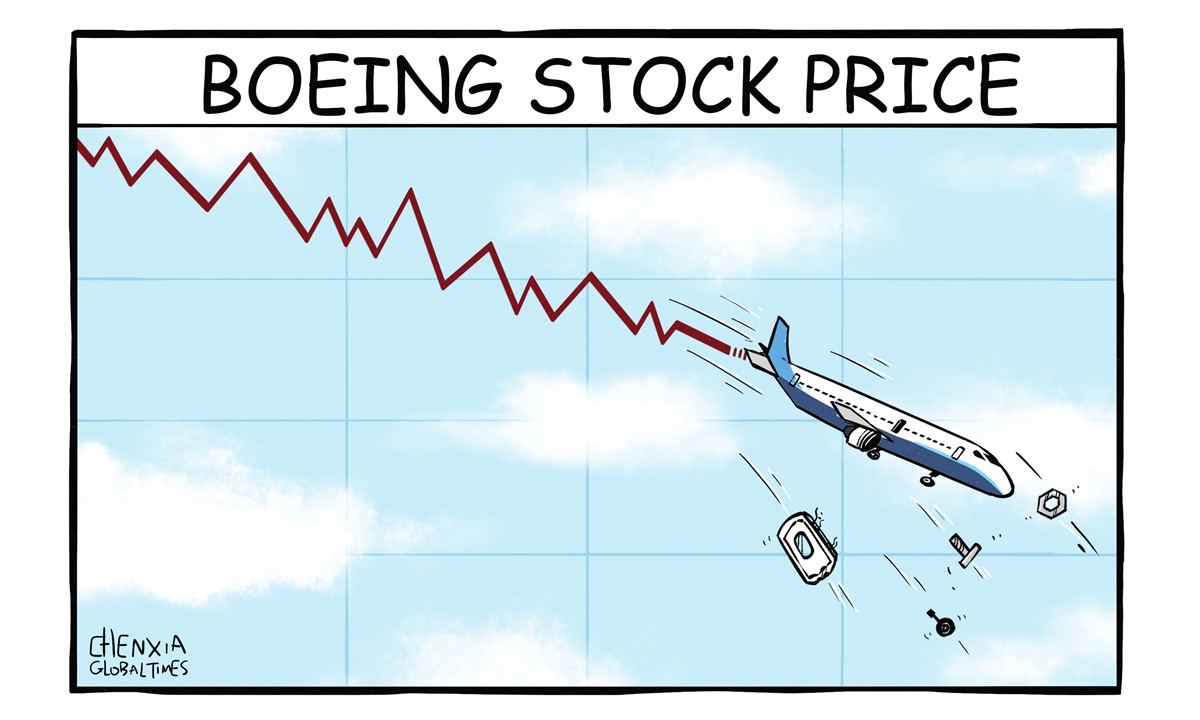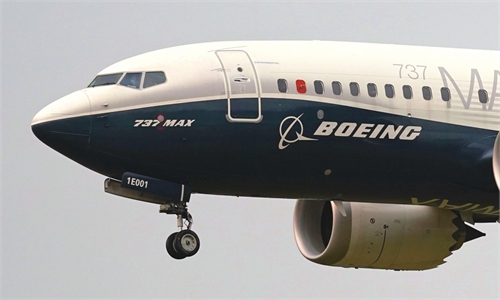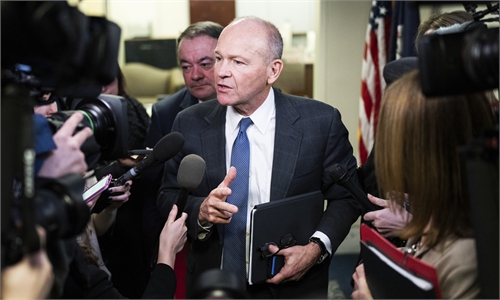Boeing's 'big trouble' is a mirror of American manufacturing industry: Global Times editorial

Illustration: Chen Xia/GT
Boeing has recently been caught in a whirlpool of safety concerns and public opinion. On Monday, a Boeing plane flying from Sydney, Australia, to Auckland, New Zealand, experienced a technical fault and made an emergency descent, plunging violently for several seconds, resulting in at least 50 injuries. This is the latest in a series of safety incidents involving Boeing planes in the past three months. Since 2024, Boeing's stock price has dropped by more than 25 percent, but the bigger impact is on its reputation. CNN bluntly stated that "Boeing is in big trouble."
Since the crashes of Indonesia's Lion Air and Ethiopian Airlines flights in October 2018 and March 2019, it seems that Boeing has not truly recovered from the continuous safety incidents. In January of this year, a new Boeing 737 MAX 9 aircraft from Alaska Airlines had its cabin door fall off in mid-air. The US Federal Aviation Administration immediately launched an audit of Boeing, uncovering 97 instances of alleged noncompliance. Of the 13 audits conducted on the body supplier Spirit AeroSystems, more than half did not pass. Some specific details are even more absurd, including mechanics using liquid soap as lubricant, using hotel key cards to check the seal of the cabin door, and even picking defective parts from the waste bin to install on the aircraft. The aviation industry is a very serious industry, where every screw is related to safety in the sky, and it is not something that can be explained away by Boeing as just a "technical event."
It is said that frost three feet thick is not formed in a single cold day. A viral video reportedly filmed by Al Jazeera in 2014 showed some Boeing assembly line workers addicted to drugs. The Boeing retiree John Barnett, who was recently reported to have "committed suicide," had been exposing many problems at Boeing for years and even filed a lawsuit. If these issues had been given attention by Boeing earlier, many accidents and tragedies could have been avoided. China is a major customer of Boeing. We urge Boeing to take concrete actions and promptly make thorough corrections to the issues reflected in the accidents and investigations.
We also see how Boeing, a company that was once known for quality and innovation, has gradually reached its current state over the past few decades. International public opinion, particularly in the US, has made a lot of reflection on it, including issues such as the loss of skilled engineering talent and the reckless outsourcing of production processes to cut costs. However, the most significant reason lies in Boeing losing its "original intention," shifting the core values of the company from prioritizing safety to prioritizing profit. Without proper supervision and a sense of responsibility, "Boeing, like so many American companies, seems to be coasting on a reputation it built up over decades," as pointed out by this comment from The Guardian, accurately identifying the true problems facing the American manufacturing industry.
The slogan of "reindustrialization" has been loudly proclaimed by several US administrations, with China often being the target in this process. In recent days, the US Trade Representative Katherine Tai accused China of "harming American workers and businesses," as if without China, the issues in the US manufacturing industry could be easily resolved. However, is this really the case? Boeing and Airbus are the two giants in the aircraft manufacturing industry that virtually face no significant competition. Boeing, in particular, dominates the domestic market in the US. It can be said that Washington's pursuit of manufacturing superiority is essentially an enlarged version of Boeing. The problem, however, is that Boeing has now fallen behind Airbus on the international stage, a situation caused by Boeing itself.
China has repeatedly told the US that both countries should focus on handling their own affairs rather than shifting blame onto others. This is good and truthful advice, but unfortunately, the US seems unwilling to heed it. However, in the reflections surrounding Boeing, the American public opinion has largely stopped emphasizing the need for "shifting its domestic problems overseas in an attempt to find a cure," indicating that reality is the best teacher.


